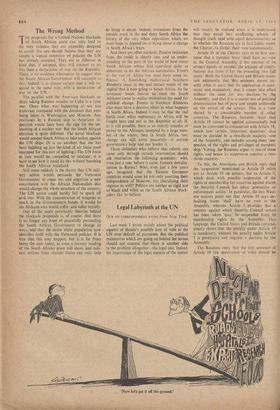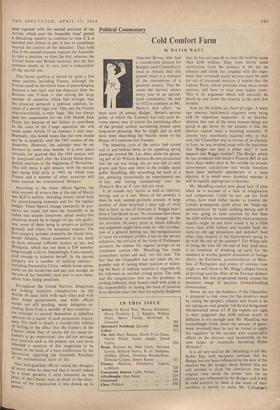, Legal Labyrinth at the UN
OUR UN CORRESPONDENT writes from New York:
Last week I wrote mainly about the political aspects of Russia's, possible loss of vote at the UN over default of payments. But the political manoeuvres which are going on behind the scenes should not conceal that there is another side to the problem altogether—the legal one. Indeed, the importance of the legal aspects of the matter will readily be realised when it is understood that they entail two conflicting schools of thought (each held with equal determination) as to whether the Russians are in fact liable, under the Charter, to forfeit their vote automatically.
Article 19 of the Charter says in its first sen- tence that a member State 'shall have no vote in the General Assembly' if the amount of its arrears equals or exceeds the amount of contri- butions due from it for the preceding two full years.' Both the United States and Britain main- tain adamantly that this sentence means ex- actly what it says; that its application is auto- matic and mandatory; that it conies into effect without the need for any decision by th Assembly, and that it is a matter not of political determination but of pure and simple arithmetic on the extent of the arrears. This is a view shared by a considerable number of otheC countries. The Russians, however, insist that Article 19 cannot be applied automatically but must be construed inconjunction with Article which lists certain 'important questions' that must be decided by a two-thirds majority vote of the Assembly, and includes among them 'sus- pension of the rights and privileges of member- ship.' Voting, the Russians argue, is one of these rights, and hence its suspension requires a two- thirds majority.
To this, the Americans and British reply that the 'suspension' mentioned in Article 18 refers not to Article 19 on arrears, but to Article 5, which deals with possible suspension of the rights of membership for countries againg whoni the Security Council has taken 'preventive or enforcement action.' In particular, the two West- ern nations point out that Article 19 says .de- faulting States 'shall' have no vote in the Assembly, whereas Article 5 provides that a country against which Security Council action has been taken 'may' be suspended from its membership rights by the Assembly. This language, the United States and Britain contend, clearly shows that the penalty under Article 19 is mandatory, whereas the penalty under Article 5 is permissive and requires a decision by the Assembly.
The Russians reply that the first sentence of Article 19 (on deprivation of vote) should be 'Now let's get it off the ground.' read together with the second sentence of the Article, which says the Assembly 'may' permit a defaulting country to continue to vote if it is satisfied that failure to pay is due to conditions beyond the control of the defaulter. They hold that if the second sentence requires the Assembly to take a decision, so does the first, whereas the United States and Britain maintain that the first sentence stands on its own, and is independent of the second one.
This Soviet position is shared by quite a few other nations, including France, although the French stand on the whole issue of peace-keeping finances is less rigid and less dogmatic than the Russian one. France is also among the large number • of countries which feel strongly that the situation demands 'a political solution, in- stead of a purely legal one. This, say the French characteristically, is only 'logic.' She has always paid her assessments for the UN Middle East Force, but because of her faihire to contribute to the costs of the Congo operation she will come under Article 19 on January 1 next year. Normally, this would mean that her vote would not be in jeopardy until the 1965 session of the Assembly. However, the calendar may be set forward by some nine months. It is now taken virtually for granted that the 1964 session will b' postponed until after the United States presi-• dential elections at the beginning of November. ThiS will mean a split session, with the second part being' held early in 1965, by which time France and a number of other countries will have entered the international Newgate.
According to the latest official figures, the total amount of arrears due at the end of March was $125.6 million, including money owed both for peace-keeping expenses and for the regular budget. These figures change constantly as pay- inents are made, but were the Assembly to be called into session tomorrow, about twenty-five countries would be in danger of the vote guillo- tine, some of them being in arrears on political grounds and others for economic reasons. The first category includes primarily the Soviet bloc, except Albania, whose assessment is too small to have amassed sufficient arrears as yet, and Mongolia, which has not been a UN member long enough to do so. Interestingly, Cuba recently Paid enough to reinstate herself. In the second category are a number of. hard-up nations— including Nationalist China—which hover peren- nially on the borderline and pay just enough on the eve of the Assembly each year to save them- selves from being penalised.
Throughout the United Nations, delegations are holding extensive consultations on the Article 19 issue, both with each other and with their home governments, and while official stands are still pending, many delegates—in- cluding those' from a number of key countries-- are reluctant to commit themselves to definitive opinions on a matter of such paramount import- ance. Yet there is clearly a considerable volume of feeling to the effect that the framers of the Charter, while they of course did not mean de- faulters tp go unpunished, also did not envisage any situation such as the present one, and never intended a question of this magnitude to be settled on the basis of a bare notification by the Secretariat, apprising the Assembly President of the mathematical facts of life.
One well-qualified official voiced the thoughts .0f many when he observed that it would indeed be a bitter paradox. if strict insistence on the letter of the Charter were to .result in the disso- lution of the organisation it was drawn up to protect.



































 Previous page
Previous page